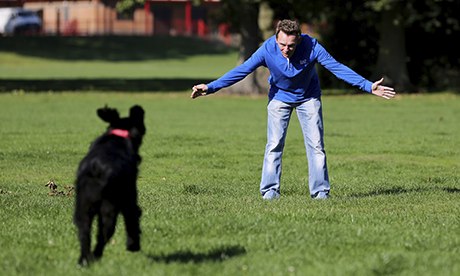
Steven Taylor has no memory of the accident that changed his life. One day, he was driving on a dual carriageway with his girlfriend Lydia, when a car undertook them. They went off the road and collided head-on with a tree. Lydia died and Steven was cut out of the car, having sustained severe head injuries and broken bones in his head and neck.
When he came out of hospital three months later, Steven had balance problems, poor short-term memory and found it difficult to process information. "My life had completely changed," he says, "as I was totally reliant on other people for everything." The accident also left him profoundly deaf. "At home I was very lonely and isolated, as I couldn't hear what anyone was saying, so I didn't go out at all."
Things began to improve the day one of the staff who cared for Steven told him about the charity Hearing Dogs for Deaf People. Steven still remembers the first day he met his dog, called Echo, at their training centre. "I sat on the floor and she came up to me and put her head on my lap, and it was love!" he says. "Having Echo has given me the confidence to go out again. I've now done things that I never would have thought of doing and am back enjoying life again."
Echo alerts Steven when the doorbell goes, or when the phone rings, and when his alarm clock goes off. "She is my ears when I'm out and about," he says. "I couldn't live independently without Echo, that's how much she means to me."
When Patricia Davies' husband Fred died 18 years ago, she started to experience severe depression. She had been growing gradually more deaf since her 20s, and had also been diagnosed with macular degeneration. Now Davies, 82, has her dog, Wilma, who arrived 18 months ago, and says: "I go everywhere I did some years ago, as I know I have a partner with me to help me to manage my everyday life again."
The biggest benefit John Wilson, 59, gets from his hearing dog is from the way it enhances his visibility as a deaf person. "No one who sees me knows that I am deaf unless I am with a dog wearing a hearing dogs jacket," he says. "When they see the dog, people are not surprised that I don't respond when spoken to!"
Hearing Dogs for Deaf People was launched in 1982. It aims to give deaf people greater independence and confidence by providing dogs trained to alert them to everyday sounds. Last year, statistics showed that 95% of recipients felt more confident after getting a hearing dog.
The charity has placed more than 1,750 dogs with deaf people: the oldest recipient a 96-year-old, the youngest a girl of eight. The training of a hearing dog lasts 18 months and the dogs typically work for seven to 10 years before retiring (when the recipient can decide to keep the dog as a pet if they wish).
The benefits of hearing dogs are clear, but despite people with assistance dogs having the same right to access services and buildings as everyone else under the Equality Act, the charity was recently forced to launch a campaign titled Let Us In after finding that 80% of hearing dog recipients had been refused entry to a shop, hotel or restaurant.
Wilson has been turned away from buildings and public transport, and thinks there is less awareness in bigger cities. "I was not let on to many London buses in the old days, which was humiliating and annoying. Taxi drivers were just as bad." He adds that it happens rarely now he lives in a smaller community in Farnham, Surrey.
Although there are occasional barriers for hearing dog recipients, there are lighter moments too. Gareth Foulkes, who works on the Isle of Man, has had a hearing dog for 20 years, and currently has a dog called Derfel. He says there is a unique downside to having a hearing dog: when they break wind. "I was once in a meeting and my dog, Derfel, let rip. I turned to the woman sitting next to me and whispered: 'I'm so terribly sorry.' 'Oh dear me Mr Foulkes,' she said, 'I thought it was your dog!'"
Taylor relates a question he was asked when he visited a school to raise awareness of hearing dogs. "One pupil asked how Echo alerted me to the door – did she bark?" He explained that Echo "alerts me with her paw, then leads me to the sound".
Although Taylor still has problems with his balance and processing information following his accident, he says that, ultimately, it gave him a new outlook on life, and having a hearing dog made a crucial difference. "I now lead a full and active life," he says. "I've met a beautiful girlfriend, I have built the home of my dreams, and I have also become confident when travelling. Echo has made such a difference to my life. I can't thank Hearing Dogs enough."

